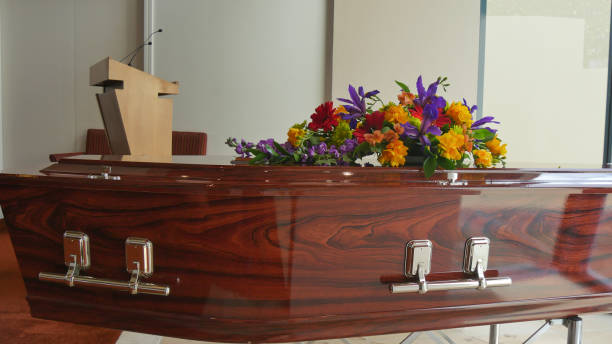For many, choosing a casket for a loved one is an emotionally and financially difficult decision. But it doesn’t have to be that way. With the right knowledge of wood and metal caskets, you can make an informed choice about which type will meet your needs in terms of both aesthetic appeal and budget. As an expert on caskets, I’m here to provide you with everything you need to know when considering whether a wood or metal casket is best for you.
The debate between wood and metal caskets has been ongoing for decades. Wood caskets are great if you’re looking for something personalized — they come in various colors, finishes and designs that allow families to create a unique look that reflects their loved ones’ life stories. On the other hand, metal caskets offer durability and affordability; they don’t require as much maintenance as wooden ones do, and they typically last longer than any other material.
In this article, we’ll explore the differences between wood and metal caskets so that you can decide which option works best for your situation. We’ll discuss factors such as cost, style options, environmental impact, sturdiness and more! By the end of this article, you should feel confident enough to make an informed decision about which type of casket is most suitable for your needs.
Definition Of Burial Caskets
Burial caskets are containers used to encase a deceased person’s body before burial. They come in various shapes and sizes, but the two most common types of caskets on the market today are wood and metal. Wood caskets can be made out of solid hardwoods like mahogany or walnut, as well as softer woods such as pine. Metal caskets are often made from steel or aluminum alloy and may have an interior lining of velvet or satin for added comfort. Both types of casket provide protection for the remains during internment and transportation. Now that we know what these materials are, let us take a look at some of their pros and cons when it comes to choosing one over another. With this information, we can better understand which type is right for our needs. Moving forward, let’s explore the advantages and disadvantages associated with wood and metal caskets.
Pros And Cons Of Wood Caskets
Wood caskets are the traditional choice for funerals and burials. They often provide a more natural, warm feeling than metal caskets. Wood is also an easily customizable material; woodworkers can create stunningly beautiful works of art with their craftsmanship. There’s no denying that wood provides a classic aesthetic look to any funeral service or burial site.
On the other hand, wood caskets may be too costly for some people, as they tend to cost significantly more than metal caskets. In addition, wooden caskets require regular maintenance in order to avoid decay and damage over time. This means having to repaint them regularly or varnish them if you want your loved one’s casket to remain looking its best.
With all this said, there’s still much to appreciate about using a wooden casket for a loved one’s funeral or burial ceremony. The beauty and warmth it brings cannot be denied making it an excellent option for those who prefer something timelessly elegant. Moving forward then, let us now examine the pros and cons of metal caskets.
Pros And Cons Of Metal Caskets
Metal caskets have a distinct set of pros and cons when compared to wood. On the plus side, they are generally more durable and help protect against water damage or other environmental hazards. Additionally, metal caskets can come in a wide variety of styles and colors, allowing for personalization that isn’t always possible with wooden models. Finally, metal is also much easier to clean than wood, making it ideal for families looking for something low-maintenance.
On the downside, metal caskets are often heavier than their wooden counterparts which can make them harder to transport. Additionally, some metals used in construction may be susceptible to corrosion over time if not properly cared for or stored. It’s important to select one made from quality materials such as stainless steel or copper rather than cheaper alloys like aluminum or brass if you plan on storing it long-term.
Metal caskets offer plenty of advantages but there are certain factors that need to be taken into consideration before purchasing one. The types of metals used in construction will vary depending on the model so it pays to do your research ahead of time before making a final decision.
Types Of Metals Used For Caskets
Believe it or not, there are over a dozen different types of metals used to construct caskets. Steel is the most commonly used metal for casket construction and accounts for about 90 percent of all caskets sold in the US. But that doesn’t mean you can’t get creative with your choice of material! Here are three popular alternatives:
- Bronze A strong but lightweight metal alloy that resists corrosion and oxidation; perfect for outdoor burial sites
- Copper Not as durable as steel, copper has a luxurious look and feel that many families prefer
- Stainless Steel An extremely durable type of metal that’s resistant to rusting and discoloration; ideal if you’re looking for something more eco-friendly
These three metals offer an interesting variety when it comes to creating an aesthetically pleasing final resting place. Of course, they come at varying prices depending on quality, so be sure to do some research before settling on one. In addition to these metals, other materials such as wood or fiberglass might also be available in certain areas. Ultimately though, what matters most is finding something that fits within your budget while still providing a respectful tribute to the deceased. With this in mind, let’s move on to compare costs between wood and metal caskets.
Cost Comparison
When it comes to cost, wood caskets are generally the more affordable option. They can range in price from a few hundred dollars up to several thousand depending on the materials and craftsmanship used. Metal caskets tend to be more expensive than their wooden counterparts; however, they offer superior protection from the elements, making them well worth the investment for those planning ahead.
Wooden caskets require regular maintenance and upkeep; otherwise, they may not hold up over time. This means additional costs associated with periodic refinishing or repair work may need to be taken into consideration when budgeting for a wood casket. On the other hand, metal caskets come ready-made and do not require much care aside from basic cleaning if needed.
Overall, when comparing cost between wood and metal caskets, one should factor in both initial purchase price as well as any potential upkeep expenses that may arise down the line. With this information in mind, individuals can make an informed decision based on their financial needs and long-term plans. As we move forward to examine environmental impact of each type of coffin, keep these considerations in mind as you weigh your options.
Environmental Impact
The cost comparison may be the first factor for many when considering a casket, but its environmental impact must not go overlooked. Whether wood or metal is chosen, each material can have an effect on the planet. Perplexing possibilities present pros and cons in terms of sustainability.
Wooden coffins are often crafted from trees that come from sustainable forests and plantations. Depending on how they’re processed, these materials can be biodegradable over time; yet, some types of wooden caskets require glues and finishes that might contain hazardous chemicals like formaldehyde and volatile organic compounds (VOCs). Ultimately, if harvested responsibly and made with eco-friendly components, this type of burial container offers a greener option than metal alternatives.
Metallic models tend to produce more carbon dioxide during their manufacturing process due to intense heating required to shape them into desired designs. Plus, they usually aren’t biodegradable because alloys such as steel don’t decompose quickly in nature. However, metals typically last much longer than wood so there’s no need for replacement every few decades—which could end up being beneficial for the environment in the long run.
To sum up, both wood and metal caskets can have their own set of environmental impacts which should be weighed before making a final decision. Availability and customization options should also play a role in the selection process.
Availability And Customization Options
When it comes to availability and customization options, wood caskets offer a wide range of choices. The variety of woods available is extensive; from traditional oak or walnut to elaborate hardwoods such as mahogany or cherry. Wood also allows for a number of decorative finishes that can be customized to the deceased’s likeness.
In contrast, metal caskets are much more limited in terms of materials and designs. Most commonly, steel is used because it provides an added layer of protection against corrosion caused by humid climates and soil conditions. Still, aluminum and bronze are additional metals occasionally employed when purchasing a metal casket. These come with already made etchings or emblems which may not reflect the wishes of the deceased’s family members accurately.
Overall, while both types of caskets have their advantages in terms of availability and customization options, wooden caskets provide much greater flexibility since there are many different kinds of woods available along with various customizations that can be tailored according to one’s preferences or needs. As such, transitioning into care instructions for each type will require further consideration on what works best for your situation.
Care Instructions
“A stitch in time saves nine.This proverb aptly applies to the care and maintenance of both wooden and metal caskets, as each must be treated differently for optimal longevity. Wooden caskets should not only be kept clean, but also sealed with a protective coating every few years to prevent warping or discoloration from moisture exposure. It is important to keep them away from direct sunlight, as this can cause fading over extended periods of time. Metal caskets similarly require regular cleaning, but they need special attention given to the sealant around their exterior edges. Over time, seals may wear down due to weathering effects which could lead to water damage within the interior of the coffin if left unchecked. Finally, it is essential that any scratches, chips or dents on either type of container are promptly attended to; otherwise rust or rot may begin developing underneath these areas. Properly caring for your chosen burial receptacle will ensure its long-term preservation and remembrance of those who have been laid inside it.
Conclusion
In conclusion, we can see that the decision of choosing a casket for your loved one’s final resting place is an important and personal one. Each type of casket has its own special benefits as well as drawbacks to consider when making this important choice. Wood caskets offer warmth, beauty, and naturalness while metal caskets are durable, affordable, and customizable. It really depends on what fits best with your family’s needs and wants for their dearly departed member.
When selecting a casket it is essential to keep in mind the materials used, the cost comparisons, availability of customization options, care instructions, and environmental impact. I am sure you will make the right choice based on all of these factors so that your beloved’s transition into their eternal rest can be done with dignity and grace.
No matter which type of burial casket you choose – wood or metal – remember that they both provide a peaceful sleeping chamber where your loved one will find peace after life’s journey here on earth comes to an end. With loving thoughts and careful consideration may you find solace in knowing that you have made a beautiful selection for them.

